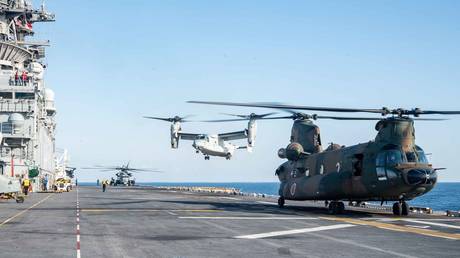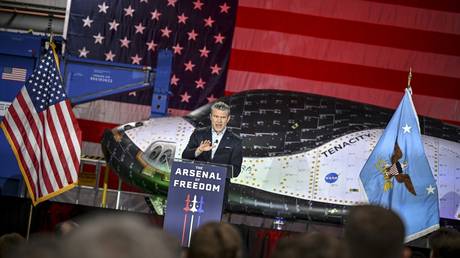
The exercise, which involves both air- and seaborne landings, will be the first of its kind, the US military said
Japan’s Ground Self-Defense Force (GSDF) launched three-week-long joint amphibious military drills with US troops stationed in Okinawa on Sunday. It stated that the exercise was aimed at deterring potential “aggression” from “competitors.”
Its Amphibious Rapid Deployment Brigade is to participate alongside the US’ 31st Marine Expeditionary Unit, Japan’s Kyodo news agency reported. The exercise, which marks the first large-scale drill in the Indo-Pacific involving both units, will run through March 25, according to Marine Corps Captain Nicole Gallegos.
Earlier this month, GSDF chief General Yoshihide Yoshida, revealed that the drills would involve 440 Japanese soldiers and 600 US Marines. It will see participants land from the sea and the air as well as various “combat situations” on the ground, Kyodo said. Japan is set to use its US-made V-22 Osprey tiltrotor aircraft for the first time, it added, citing officials.
Commanding officer Colonel Michael Nakonieczny praised the forces as “two of the best trained and most prepared crisis response” units in the so-called ‘first island chain’. He said the primary purpose of the exercise was to “deter competitor and adversary aggression.”
The ‘first island chain’ refers to a chain of archipelagos encompassing Japan, Taiwan, the northern Philippines, Borneo, and the Kuril and Ryukyu Islands in the southwest to Russia’s Sakhalin Island and Kamchatka Peninsula in the northeast. The term has been used both by China and the US in their relevant foreign policy and military strategies.
The Senkaku islands – an uninhabited group northeast of Taiwan, in the East China Sea – also fall within that chain. The isles are currently administered by Japan but are considered by Beijing to be disputed territory.
According to Kyodo, the drills are part of the US Expeditionary Advanced Base Operations concept – a strategy aimed at preventing America’s adversaries, such as China, from impeding US military engagement in areas of concern. The concept includes a persistent naval presence in such regions, even under normal circumstances.
Neither Japan nor the US has named the specific adversary that prompted the drills. However, the announcement of the exercise was made roughly two weeks after the Japanese Foreign Ministry claimed the four southernmost Kuril Islands were being “occupied” by Russia. Tokyo has compared the “occupation” to Russia’s February attack on Ukraine and claims “it contradicts international law,” according to the Russian news agency TASS.
The Kuril Islands have been a point of contention between Moscow and Tokyo for decades. Russia acquired them after the end of World War Two and considers them an inalienable part of its territory. However, Japan continues to insist it has sovereignty. The dispute over the isles prevented the two nations from signing a formal peace treaty after the war.




